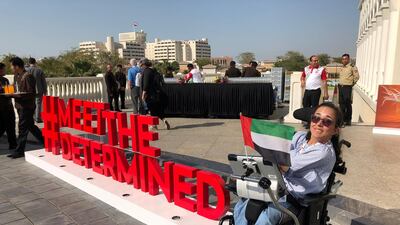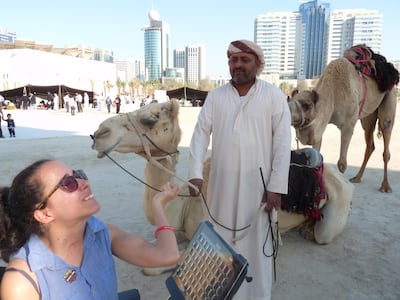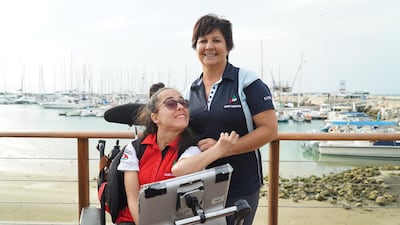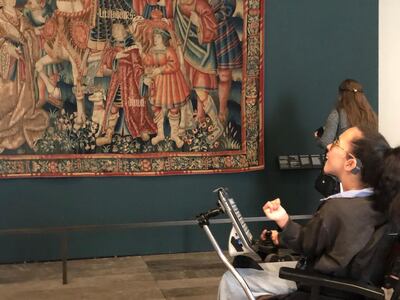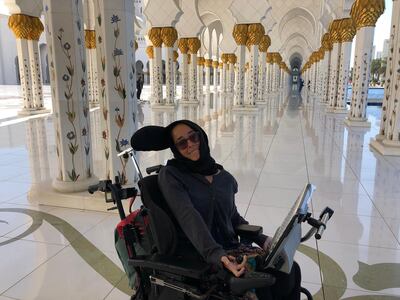See the sunrise over the Annapurna Mountains, swim in Mexico's Yucatan cenotes, camp beneath the Northern Lights, or hang-glide over Rio de Janeiro. These are only some of the adventures that would not look out of place on Nadia Clarke's bucket list.
Clarke, 26, has cerebral palsy and is wheelchair bound. She is deaf and can communicate only via sign language and an electronic voice aid. She's also a dedicated adventure traveller who has on elephants, backpacked around Australia and made it her mission to tick experience after experience off her travel list.
In recent weeks, Clarke has been holidaying in the UAE, where she bartered at spice souqs, went sailing in the Arabian Gulf, visited a pearl farm and headed out into the dunes on a desert safari. Set up as a way to show that disability is not a barrier to travel, the trip was organised by Travel Counsellors, with sponsorship from tourism authorities in Abu Dhabi, Dubai and Ras Al Khaimah.
Hailing from West Yorkshire in the UK, Clarke is a volunteer at Equal Care Co-op, a British organisation that aims to improve the relationship between care-givers and the people they look after. But the young woman also has a passion for travel.
About eight years ago, she first met the Travel Counsellors and began working independently with the company, quickly becoming its ambassador for accessible travel. For Clarke, adventure travel is an important draw when she's booking a trip. "I get nervous every time I travel just thinking about whether I'll be able to access everything I want or need, but you have to face challenges head on," she says. "I never say no to a challenge, but I always need to check, first of all, is it safe for me?"
With Thailand, Austria and Dubai all featuring on her bucket list, Clarke was keen to take up the offer of a visit to the UAE, but she also had some reservations. "I wasn't sure if it would be accessible and I thought it would be too expensive," she says. But putting those thoughts to the back of her mind aside, she packed a bag and boarded an Emirates flight to Dubai.
Starting out
Arriving at Dubai International Airport, Clarke was met by a Marhaba representative, who helped guide her and her personal assistants through the airport. Dedicated immigration counters for people of determination presented a quick and easy introduction to the holiday and, in some ways, set the tone for what was to come. She returned home to the UK last week, and says that "the UAE was the most accessible place I have travelled to so far, and I've travelled a lot".
She had 12 action-packed days travelling the country. In the north, she took in what has been dubbed the adventure emirate of the UAE, Ras Al Khaimah. She visited Suwaidi Pearl Farm to find out more about the pearl diving town. "The guide was really amazing at communicating with me," she says.
A spot of adventure was next, with a trip to the Jebel Jais viewing deck, about 1,250 metres above sea level. Entirely wheelchair accessible, the 22,730 square metre park is set up with binocular stations to allow visitors to make the most of the views. After a few nights at The Ritz-Carlton Ras al Khaimah, Al Wadi Desert and Al Hamra Beach, which Clarke found entirely wheelchair accessible, the group, which included Maggie Bootsman, UAE general manager of Travel Counsellors, returned to Dubai.
Leaving dry ground
There, the itinerary covered Bastakiya and Dubai Creek, where scenic views are easily accessible to people of determination thanks to widened streets and ramp access. The next day, Dubai Offshore Sailing Club would present Clarke's biggest challenge. "It was my first time to try sailing, so I was definitely a little bit scared at first," she says.
Luckily, volunteers from Sailability – a worldwide, non-profit movement – were on hand to help. Taking control of a boat for the first time can be daunting for anyone, but sailing allows people of determination to achieve a sense of independence, releasing them from some of the restrictions that they can face on land. Wearing a buoyancy aid, Clarke headed out on to the water in an Access Dinghie – fitted with supportive seating to keep her in the centre of the boat – and had a great time. "The staff all made me feel very safe and relaxed and the sailing was so accessible, I loved it," she says.
Next, the group visited Al Noor Centre and Dubai Autism Centre to chat with staff and students about accessibility issues in the Emirates. This was followed by a visit to La Perle by Franco Dragon at Al Habtoor City, an aqua theatre experience that was one of Clarke's Dubai highlights. Her wheelchair-accessible seat offered great views of the action, which she describes as "breathtaking".
A Yellow Boat tour of Dubai Marina, Bluewaters Island and the towering Ain Dubai, taking in the views from At The Top at Burj Khalifa, a tour of Ibn Battuta Mall and a stay at Sheraton Mall of the Emirates concluded the Dubai portion of her trip.
Abu Dhabi bound
In Abu Dhabi, Clarke checked into the emirate's newest luxury hotel, Abu Dhabi Edition. Designed by Ian Schrager, the hotel's inclusivity impressed Clarke. "The food was delicious, the room was beautiful and I liked that they had staff from 52 countries."
In the capital, Clarke also took in the Founder's Memorial, toured Abu Dhabi Falcon Hospital, went to Louvre Abu Dhabi and visited Sheikh Zayed Grand Mosque. The end of her trip coincided with the opening of the Special Olympics World Games.
"It was an amazing experience, I can't believe there were people from 190 countries in one place," Clarke says. "I met some of the royal family and I saw the torch being carried. The opening ceremony was fabulous."
Despite having spent almost two weeks in the country, Clarke says she wishes she had more time. "I felt very accepted, and very welcomed into the culture. I felt like the people were very understanding and I learnt so much; I particularly enjoyed visiting the mosque."
While there is still work to be done in making the UAE entirely accessible for people of determination, it’s on the right track, Clarke says.
“I was able to stay in my electric wheelchair and had full independence; it felt great. The people are fantastic, so helpful and very disability aware,” she says.
In Dubai, all modern buildings and projects now follow the Dubai Universal Code, rules that the emirate's public spaces must adhere to, such as installing handrails and accessible bathrooms at art galleries, museums, malls and festivals.
Many of the city’s beaches have already been upgraded to include wheelchair-friendly pathways that roll across the sand, so that people with reduced mobility can enjoy the pleasures of Dubai’s coastline. That said, too often, temporary improvement works on sidewalks, non-ramp access to buildings or street widths in some of the country’s older neighbourhoods restrict access for people of determination.
Time to grow
For Clarke, this is understandable. “Accessibility in the UAE will continue to improve as more people with additional needs visit,” she says. “Every disability is different and it’s hard to get it perfect for everyone, but it is nearly perfect.”
This is something the UAE government is trying to improve, especially as the country has designated 2019 the Year of Tolerance. The theme fits with the World Tourism Organisation's Global Code of Ethics for Tourism, which states that "everybody should have the opportunity to enjoy a safe and fulfilling trip without discrimination for gender, race, disability or other issues".
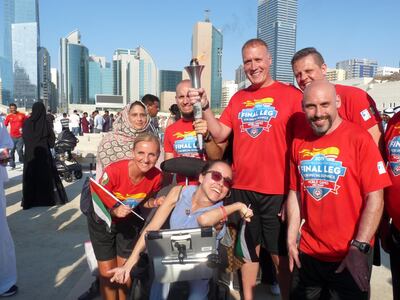
Bootsman too, was impressed by what she saw throughout the adventure. “Nadia’s trip has proved groundbreaking, showcasing the UAE’s credentials as an accessible travel destination as part of its wider accessibility strategy,” says the Travel Counsellors manager.
Clarke had a fulfilling trip, but it is worth noting that she travelled with two personal assistants and a sign language interpreter, and also had support from the Travel Counsellors. All the same, she is confident that people of determination could also visit the country alone and have a positive experience.
“The UAE has some amazing facilities and services available for disabled people,” she says. “I recommend it to everyone.”
